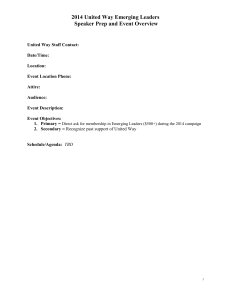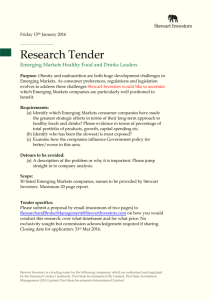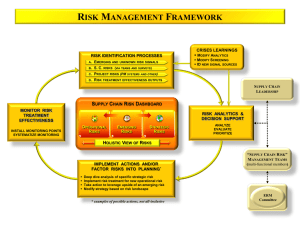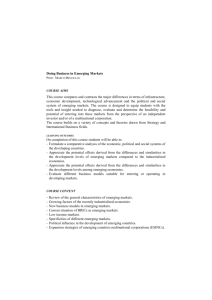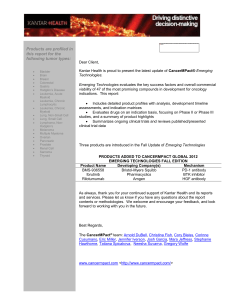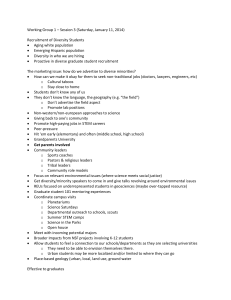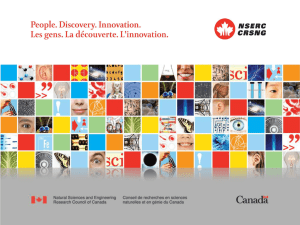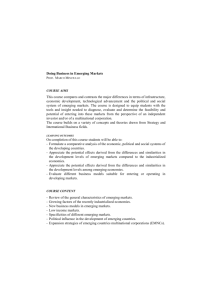UNIVERSITY OF CALGARY
advertisement
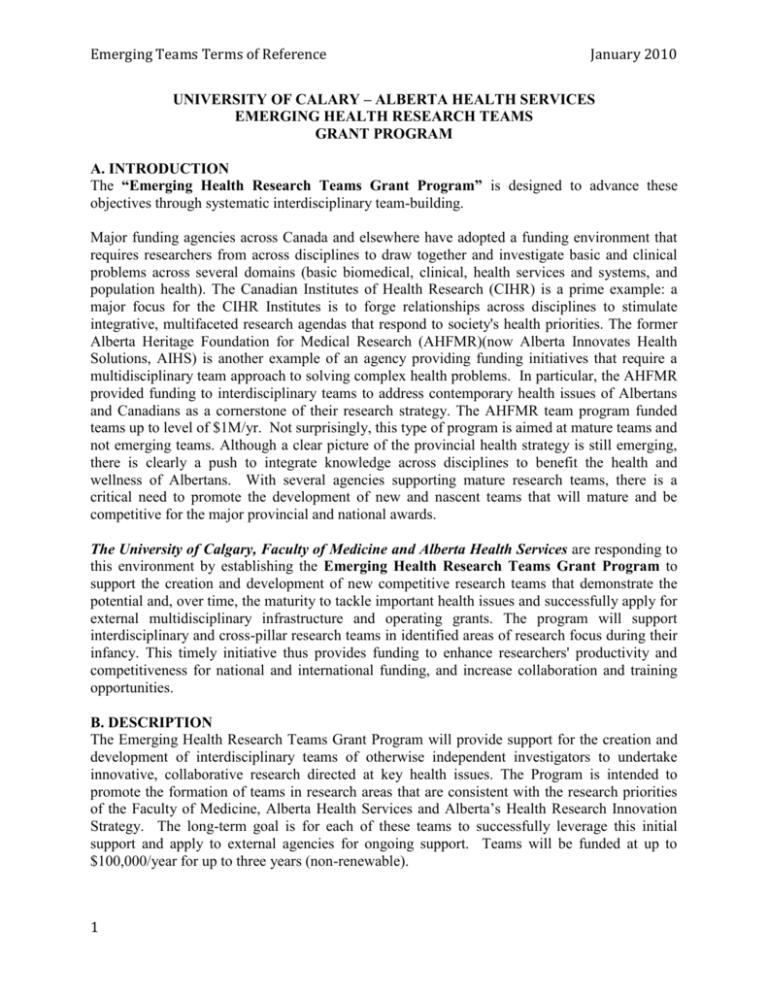
Emerging Teams Terms of Reference January 2010 UNIVERSITY OF CALARY – ALBERTA HEALTH SERVICES EMERGING HEALTH RESEARCH TEAMS GRANT PROGRAM A. INTRODUCTION The “Emerging Health Research Teams Grant Program” is designed to advance these objectives through systematic interdisciplinary team-building. Major funding agencies across Canada and elsewhere have adopted a funding environment that requires researchers from across disciplines to draw together and investigate basic and clinical problems across several domains (basic biomedical, clinical, health services and systems, and population health). The Canadian Institutes of Health Research (CIHR) is a prime example: a major focus for the CIHR Institutes is to forge relationships across disciplines to stimulate integrative, multifaceted research agendas that respond to society's health priorities. The former Alberta Heritage Foundation for Medical Research (AHFMR)(now Alberta Innovates Health Solutions, AIHS) is another example of an agency providing funding initiatives that require a multidisciplinary team approach to solving complex health problems. In particular, the AHFMR provided funding to interdisciplinary teams to address contemporary health issues of Albertans and Canadians as a cornerstone of their research strategy. The AHFMR team program funded teams up to level of $1M/yr. Not surprisingly, this type of program is aimed at mature teams and not emerging teams. Although a clear picture of the provincial health strategy is still emerging, there is clearly a push to integrate knowledge across disciplines to benefit the health and wellness of Albertans. With several agencies supporting mature research teams, there is a critical need to promote the development of new and nascent teams that will mature and be competitive for the major provincial and national awards. The University of Calgary, Faculty of Medicine and Alberta Health Services are responding to this environment by establishing the Emerging Health Research Teams Grant Program to support the creation and development of new competitive research teams that demonstrate the potential and, over time, the maturity to tackle important health issues and successfully apply for external multidisciplinary infrastructure and operating grants. The program will support interdisciplinary and cross-pillar research teams in identified areas of research focus during their infancy. This timely initiative thus provides funding to enhance researchers' productivity and competitiveness for national and international funding, and increase collaboration and training opportunities. B. DESCRIPTION The Emerging Health Research Teams Grant Program will provide support for the creation and development of interdisciplinary teams of otherwise independent investigators to undertake innovative, collaborative research directed at key health issues. The Program is intended to promote the formation of teams in research areas that are consistent with the research priorities of the Faculty of Medicine, Alberta Health Services and Alberta’s Health Research Innovation Strategy. The long-term goal is for each of these teams to successfully leverage this initial support and apply to external agencies for ongoing support. Teams will be funded at up to $100,000/year for up to three years (non-renewable). 1 Emerging Teams Terms of Reference January 2010 C. OBJECTIVES Develop new competitive research teams that will be successfully compete for infrastructure and/or team operating funding applications in the future (i.e., from the Canada Foundation for Innovation (CFI), Genome Canada, Alberta Innovates-Health Solutions, CIHR, National Institutes of Health (NIH), etc.); Foster multidisciplinary and cross-theme research in areas that are consistent with the research priorities of the Faculty of Medicine and our funding partners, and which have been targeted by major provincial and federal funding agencies; Train and establish new highly-qualified personnel in identified areas of research focus; and Create a team environment that favours the development of new fundable research projects Result in improved health and health services for Albertans D. ELIGIBILITY CRITERIA For this round of applications, two of the seven available grants are targeted: one in the area of Cancer and the other in the area of Neuroscience. The remaining five grants are unrestricted. Although individual Emerging Team members may already be part of other successful research teams, the Emerging Team Health Research Program will only fund new teams. The Emerging Team may not be a sub-team of a larger project. At least two and preferably three of the CIHR Research Pillars (biomedical research; clinical research; health services/systems research; social, cultural, environmental and population health) will be covered by the research program of the Emerging Team. Emerging Teams must consist of at least four investigators. It is anticipated that new investigators may join the team as the project evolves. The Emerging Team Leader(s) must have proven leadership capabilities, and a primary appointment in the Faculty of Medicine or with Alberta Health Services. Team membership from more than one Faculty at the University of Calgary and/or more than one portfolio of AHS is encouraged. At least three of the investigators must have established research track records in areas related to the collaborative project(s) proposed. Although research strength is desirable for all team members, one member may be a clinician whose primary contribution is to connect the project to an area of clinical practice. Emerging Teams will include a mix of junior and senior researchers. Emerging Teams should demonstrate a clear mentoring structure and a training program. Members of the Team may pursue other avenues of research in addition to their commitment to the Team’s research program; however, each individual investigator must commit sufficient time to the team to ensure the achievement of its research objectives. Funding provided by the Emerging Health Research Teams Grant Program must be acknowledged in all presentations and publications that result from the team’s funded research program. Emerging Teams must indicate how their program of research will have impact on relevant health problems or health systems issues. 2 Emerging Teams Terms of Reference January 2010 E. FUNDING AND ALLOWABLE COSTS Emergent Teams will be funded at a maximum level of $100,000/year for a maximum of three years, unless stated otherwise at the time of competition. Continued funding is subject to a satisfactory progress report submitted annually. Grants may not be used to support team members’ currently-funded research projects. Funds will be not released until appropriate ethics approvals are in place. Eligible Costs: Costs of data collection and maintenance of information holdings directly related to the Emerging Team’s research program Costs of networking activities, including travel, collaboration planning, and research exchange activities directly related to the Team's research program Operating costs for the proposed new collaborative research projects, which must be distinct from those for which team members currently receive funding. Salaries of research trainees (graduate and postdoctoral) and other personnel (e.g., research coordinator, data clerks, etc.) whose participation will enhance the collaborative research productivity of the Emerging Team. Salaries must be commensurate with provincial and national standards. Purchase of minor equipment (within limits, see below). Ineligible Costs: The Emerging Team’s grant may not be used to purchase major equipment (over $10.000). F. APPLICATION PROCESS Eligible research areas for funding will be determined by the Emerging Health Research Teams Steering Committee. Applications to the Emerging Health Research Teams Grant Program are made in two stages: a letter of intent and a full application. Stage 1: Letter of Intent (LOI) Process: Letters of Intent will be reviewed for conformity with the specific mandate and research foci of the Emerging Health Research Teams Grant Program. If the Letter of Intent is deemed of sufficient promise the Team will be invited to submit a full application. The LOI format includes: Title Leader (s) - affiliation and contact information List of team members, title and affiliation, signatures Signature of Team Leader, Department Head/Chair, and Associate Dean (Research) Fit with the strategic plan of the Faculty of Medicine, AHS, Alberta’s Health Research Innovation Strategy and/or targeted research areas. Preliminary budget 3 Emerging Teams Terms of Reference January 2010 Brief description of the research program. In three pages (not including figures and references), the proposal should address the following: o The overall complex health issue or question to be addressed and why this research would benefit from a multidisciplinary approach; o The objectives of the research program to be undertaken by the Team over the period of funding; o A brief description of the importance and novelty of the hypotheses or questions to be addressed and expected findings; o The proposed role of all partners involved in the research program; o The preliminary plan for the research program, including schedule of work and knowledge translation strategy; o A description of the research training and mentoring environment, with particular emphasis on any interdisciplinary training programs that will be developed; o Potential targets for future funding to be sought by the Team. In addition, please attach: 1) A cover letter that addresses: The implications for AHS including space, funding, time, increased number of procedures, etc., if applicable The implications for Faculties involved including space, funding, time, impact on ongoing operations and maintenance costs, etc., if applicable Is matching funding available or required? Stage 2: Full Application Selected LOI applicants will be invited to submit full applications. A full, yet brief, description and review of each component of the research, its management, etc., are required as part of the application. A multidisciplinary committee will review the full applications. A template and requirements for the full application form will be available to those who have submitted a successful LOI. The full application will include a brief proposal, containing the following information: Title of the research proposal; Description of the Team; A statement of the research project(s) to be undertaken, including background information, the significance of the issues, and the value of the anticipated results; A description of how research and collaborations will be facilitated among team members; A description of the desired outcomes (e.g., preliminary data, scientific publication, workshops, training, etc.); A plan for leveraging the funds provided through the Emerging Health Research Team Grant Program including targets for future funding; A detailed budget Agreement to provide approval from the institution’s human ethics and/or animal ethics committee (i.e., if required based on the nature of the research), biohazard certificates etc., should funding be approved. 4 Emerging Teams Terms of Reference January 2010 The proposals must also include an appendix containing a brief current CV for each Team Member, as for the LOI stage. G. CRITERIA FOR PEER REVIEW Each team will be evaluated as a single integrated entity. Thus, the scientific merit of the new collaborative research programs will be evaluated and team applications will be assessed on the extent to which they do the following: Demonstrate scientific excellence; Address an important health research issue with the potential for impact; Demonstrate that funding of the Emerging Team would result in a mature research team; Demonstrate the cross-theme nature of the research program project(s) and how the team will develop a meaningful research collaboration; Approach the research issue through an original, innovative, coordinated and feasible research plan, which will generate valid, reliable and useful data; Provide a plan to leverage funds provided by the Emerging Health Research Teams Grant Program; Demonstrate the capacity of the proposed Emerging Team to compete for other sources of operating funding, and eventually to apply for other infrastructure support as a result of the investment. All applications, including those in targeted areas, will be held to the same standards and criteria. H. EVALUATION OF FUNDED TEAMS Each successful team will be required to submit annual reports and continued funding over the three years will be dependent on the progress of the team. Key performance indicators will include demonstration of team activities, including evidence of networking and collaboration. These can take the form of publications, conference presentations, abstracts, project ethics approval, joint retreats and/or conferences and website development. Barriers and challenges faced by the teams will also be captured to help inform future teams. 5 Emerging Teams Terms of Reference January 2010 I. HOW TO APPLY: IMPORTANT DATES 1) LOI Registration: To facilitate planning, Teams should register their intent to submit an LOI via e-mail, identifying the team leader, team co-leader(s) (if applicable), and the title. No other information is required at this time. Please send the registration e-mail to Ms. Patricia BeugJang in the Faculty of Medicine Research Office at pabeug@ucalgary.ca 2) LOI Submission: The original plus an electronic copy (Word or PDF) of the LOI must be submitted to Research Services not later than 4 p.m. March 15, 2011. 3) Release of LOI Competition Results: Those LOIs (teams) that have been selected to submit full applications will be notified by April 8, 2011. 4) Full Application Submission Deadline: The original plus an electronic copy (Word or PDF) of the full application must be submitted to Ms. Patricia Beug-Jang (pabeug@ucalgary.ca) in the Faculty of Medicine Research Office, no later than 4 p.m on May 31, 2011. 5) Release of full application competition results will be before June 30, 2011. J. CONTACT INFORMATION For further information about the Emerging Health Research Teams Grant Program, please contact Ms. Patricia Beug-Jang in the Faculty of Medicine Research Office at pabeug@ucalgary.ca. 6
